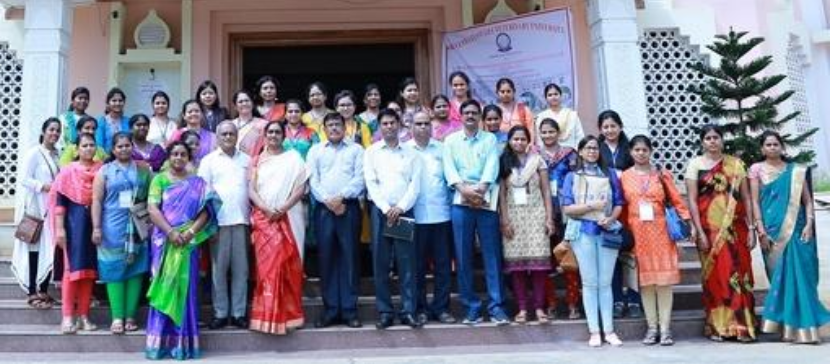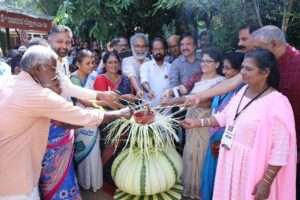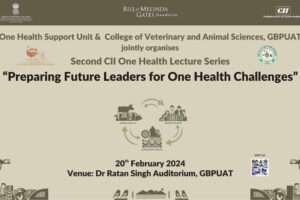 Dr. Mastanbi Shaik, Dr. Leena and Dr. Sreevidya Nambiar participated in the Model Training Course organized by Department of Veterinary Animal Husbandry Extension Education, NTR College of Veterinary Science, Gannavaram, Andhra Pradesh and share their observations here.
Dr. Mastanbi Shaik, Dr. Leena and Dr. Sreevidya Nambiar participated in the Model Training Course organized by Department of Veterinary Animal Husbandry Extension Education, NTR College of Veterinary Science, Gannavaram, Andhra Pradesh and share their observations here.
CONTEXT
Today’s agricultural and livestock enterprise demands a challenging combination of individual talent, collective ability and effort. The emerging view of extension is not that of a service or system, but of a knowledge and information support for farmers. Competencies have become a leading construct and refer to a complex combination of knowledge, skill and attitudes which tend to improve the effective performance of livestock extension professionals. In this context, a Model Training Course was organized by Dr. B. Subrahmanyeswari, Professor & Head, Department of Veterinary and Animal Husbandry Extension Education, NTR College of Veterinary Science, Gannavaram, Andhra Pradesh.
This training was sponsored by the Directorate of Extension, Ministry of Agriculture and Farmers Welfare (MoA&FW), Government of India. Thirty women veterinarians working at field level from State Department of Animal Husbandry (SDAH) of seven states i.e. Uttarakhand, Assam, Maharashtra, Andhra Pradesh, Karnataka, Tamil Nadu and Kerala participated in the training programme. The training was embarked upon with a motive of enhancing extension skills and technical knowledge of women veterinarians who have a great role in empowering women livestock farmers.
PROGRAMME
Inaugural Session The training programme was inaugurated on 23 October 2017 by the Chief Guest, Smt. V. Usha Rani, IAS, Director General, MANAGE, Hyderabad. In her exemplary inaugural speech, the Director General emphasized on the need for change in curriculum at the undergraduate level of the Veterinary Sciences and stressed upon the importance of establishment of ‘information centers’ at the Veterinary Dispensaries of SDAH which could provide livestock related information at the right time to the right persons. She was glad that a large number of women veterinarians are entering into extension field and the core competencies of these professionals need to be enhanced to reach out to the needy groups of the society.

Special Guest and Honorable Vice Chancellor of the university appreciated the course director for organizing this unique training programme and highlighted the essentiality of improving core competencies of women livestock extension professionals especially in a country like India, where millions of families, particularly women are extensively involved in livestock farm activities. A Compendium was released by the Chief Guest in the august presence of other dignitaries, Dr. Y. Hari Babu, Honorable Vice Chancellor, Sri Venkateswara Veterinary University (SVVU), Tirupati; Professor Dr. D. Srinivasulu, Director of Extension, SVVU; Professor Dr. G. Srinivasa Rao, Associate Dean of the college, Dr. P.S. Karunanidhi, Member, Board of Management, SVVU and Dr. Damodar Naidu, Additional Director (Health), SDAH, Andhra Pradesh. The inaugural speech was followed by the introduction of participants and a vote of thanks.
Overview of Technical Sessions
The eight days training programme was divided into four technical sessions and comprised of 30 presentations by resource persons, field visits, group exercises and meditation.
Session I: Specific Livestock Extension Competencies
This session included presentation on “Livestock research – Implications of extension field professionals” by Dr. S.V.N. Rao, Rtd. Professor & Head, Rajiv Gandhi Institute of Veterinary Education and Research, Puduchery. This was a highly motivating and inspiring presentation, taking the example of research work on promoting improved backyard poultry. He also engaged in another
elaborate talk on the participatory approaches being a veterinarian in the field of veterinary extension education. Methods of Participatory Rural Appraisal (PRA) and Rapid Rural Appraisal (RRA) were discussed in detail, emphasizing the need of active involvement of farmers in an extension programme, and on choosing beneficiary schemes which are suitable to geographical areas in the country. Skill development in veterinary education was also stressed upon. He also pointed out how a true combination of knowledge, skill and attitude contributes to a successful extension programme.
Another presentation on “ICTs in livestock sector: Research evidences” by Dr. D. Thammi Raju, Professor & Principle Scientist, NAARM, conveyed the importance and innovations concerning ICTs, application of ICT tools in livestock sector and also the ethical use of social media in Animal Husbandry Department.
Presentation on “Core competency for technology transfer” by Dr. S. Senthil Vinayagam, Principle Scientist, NAARM, threw light upon the strong extension systems that exist in the nation and the need for disseminating them to improve performance and competency in veterinary as well as agriculture fields.
The presentation on “Assessment of core competencies of livestock” and “Animal welfare education in India” by Dr. P.V.K. Sasidhar, Director, School of Extension and Development studies, IGNOU, New Delhi, was a detailed discussion and first hand information on animal welfare, animal and human relationships and the five freedoms concerning all living beings. He also discussed the assessment of core competencies of livestock which included measures of integration of knowledge, skill and attitude and their field application.
Presentation on “Veterinarians role in strengthening of dairy development organization working on co-operative model” was given by Dr. K.V. Prasad, Chief Manager, Field operations, Visakha Dairy.
He elaborated the dairy development organizations working on co-operative lines and also explained about the working of Sreeja Mahila Milk producer company, Tirupati, touching various aspects of dairy production and marketing.
Session II: Specific Subject Matter Competencies
This session included presentation on “Towards understanding animal disease dynamics, prevention and control: Impact of livestock production systems, value chains and biosecurity” by Dr. M.V. Subba Rao (Ex- SAARC Regional Laboratory Co-ordinator, FAO of the United Nations, Kathmandu and former Dean, ANGRAU & SVVU, Andhra Pradesh and architect of Veterinary College, Gannavaram). He elaborated the measures that reduce the risk of introduction and spread of diseases.
This session also included several presentations given by resource persons viz., “Role of livestock in sustainable livelihoods – A Gender perspective” by Dr. B. Subrahmanyeswari, Professor & Head, Department of Veterinary and Animal Husbandry Extension Education; “Management practices for enhancing profitability of dairying in smallholders farms” by Dr. S. Jagadeeswara Rao, Professor and Head, LPM department; “Strategies to augument milk production through nutritional management” by Dr. D. Nagalakshmi, Dept. of Animal Nutrition, PVNR Telangana Veterinary University; “Reproductive health management in dairy cattle” by Dr. K. Sadasiva Rao, Professor & Head, Department of Animal Reproduction; “Antimicrobial resistance – The crisis and concerns” by Dr. P. Ravikumar, Professor & Head, Department of Pharmacology; “Serological and molecular approaches for animal disease diagnosis” by Dr. R. N. Ramani Pushpa, Professor & Head of Veterinary Microbiology; “Diagnostic Ultrasound in bovines” by Dr. V. Vaikunta Rao, Professor & Head of Clinical Medicine; “Diagnosis of parasitic infections at field level” by Dr. C. Sreedevi, Professor & Head of Veterinary Parasitology; “Advances in Diagnostic Imaging Techniques in large animals” by Dr. M. Sreenu, Professor & Head, Department of Surgery & Radiology; “Post mortem examination –
An indispensable tool for disease diagnosis” by Dr. P. Annapurna, Associate Professor of Pathology; “Long bone fracture management in farm and at field level” by Dr. M. Raghunath, Professor of Surgery; “Methods of identification of adulterated livestock products” by Dr. T. Srinivasa Rao, Associate Professor & Head of Veterinary and Public Health department; “Benefits of Integrated livestock farming” by Dr. P. Sireesha, Assistant Professor, Department of Veterinary and Animal Husbandry Extension Education; “Extension group methodologies in livestock training and development” by Dr. Sunita Prasad, Assistant Professor, Department of Veterinary and Animal Husbandry Extension Education; “Measures to curb occupational zoonoses at field level” by Dr. Bindu Kiranmayi, Assistant Professor, Department of Veterinary Public Health and “Prospects of vets in Poultry Industry” by Dr. Sai Ram Kumar, Regional Technical Manager, Kemin, South Asia Pvt. Enterprises.
Session III: Communication and Professional Developmental Competencies
This interactive and transforming session was handled by Dr. P.B. Sreenivas, a reputed HRM and learning consultant, Hyderabad.
He imparted important messages on communication and professional development through meaningful video clippings and interesting intellectual exercises which would serve a lifelong impact on the trainees. Measures to enhance the leadership qualities as extension professionals were identified and discussed. Stress management was also a topic of interest in this session.
Session IV: Personality Development Competencies
This session was engaged by Ms. Archana Naidu, Chief People’s Officer from Srinivasa hatcheries. It was a highly motivational talk and enlightened all on different components of improving personal competencies which reflects on tackling professional challenges effectively.
Field Visit
On 28 October, a visit to LAM farm at Guntur of SVVU was arranged and the trainees also saw the Ongole cattle conservation unit and embryo biotechnology transfer units functioning.
Meditation
An exclusive mind blowing yoga and group meditation session for the benefit of trainees, students and faculty members of NTR Veterinary College was engaged by Smt. Naga Ramadevi, Pyramid Dyaan center, Vijayawada. This session was organized during the evening hours for three consecutive days, which acted upon as a great stress relieving and refreshing session.
VALEDICTORY PROGRAMME
The training programme concluded on 30 October 2017 afternoon, with the valedictory programme chaired by the Associate Dean, Dr. G. Sreenivasa Rao, in the presence of Chief Guest, Dr. Rathna Kumari, Joint Director, VBRI; Dr. Jagadeeswara Rao, Member, Board of Management, SVVU; Course Director Dr. B. Subrahmanyeswari, Professor and Head, Dept. of Veterinary & AH Extension Education.
The Chief Guest highlighted the role of women veterinarians in improving livestock productivity and congratulated the trainees for their active participation in this exclusive training programme. The Course Director expressed satisfaction over the enthusiastic and energetic participation of the women veterinarians who came from different parts of the country. The Associate Dean expressed his happiness in being given the opportunity to host the event. The dignitaries distributed certificates to the participants.
On behalf of the participants of the training programme, Dr. Sreevidya Nambiar K. (Kerala); Dr. Krishna Rani Nath (Assam); Dr. Saravana Kumari T. (Tamil Nadu); Dr. Shikakrati N. (Uttarakhand) and Dr. Lavanya (Karnataka) spoke on the training experience and expressed their sincere gratitude to the organizing department and the course coordinator.
The trainees also witnessed lighter moments by taking part in a traditional fashion parade and were interviewed by the print and electronic media and they expressed their happiness at being one of the participants in the training programme.
OUR IMPRESSIONS
The training programme was extremely useful and informative. This programme included effective sessions by eminent faculties from all over India, discussions, group exercises, field visits, exploration of latest trends and practices related to improving core competencies of women veterinarians on different clinical and non clinical aspects along with communication and personal skills development.
We even had a brief question and answer session with experts, which gave us an opportunity to clarify our doubts. It was worth mentioning that interaction and friendship between women veterinarians from different parts of the country was very refreshing and joyful.
Dr. Mastanbi Shaik is Veterinary Assistant Surgeon, Prakasam District, Andhra Pradesh (presently PhD scholar, Department of Veterinary and Animal Husbandry Extension Education, Sri Venkateswara Veterinary University, Tirupati, Andhra Pradesh) (drmastanbi@gmail.com). Dr. Leena M. L. is Senior Veterinary Surgeon, V.H., Shornur, Kerala. Dr. Sreevidya Nambiar K. is Veterinary Surgeon, Veterinary Dispensary, Kodakkad, Kerala.





Add Comment